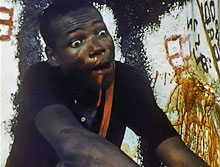Included in boxset Eight Films by Jean Rouch.
THE MAD MASTERS (LES MAITRES FOUS), the most controversial and also the most widely celebrated work by ethnographic filmmaker Jean Rouch, depicts a possession ritual of the Hauka religious sect using the delirious techniques of "cine-trance."
The film opens on the bustling streets of Accra, the capital of the Gold Coast (modern-day Ghana), a major colonial port city that serves as a stage for the collision of the traditional and the modern. Among the diverse groups who populate the city are members of the Hauka religious movement, which began in Niger among the Songhay people, and migrated with them to The Gold Coast.

From Accra, THE MAD MASTERS takes us to the rural compound that is the site for an annual Hauka ceremony. Hauka mediums nominate initiates and listen to penitents, before leading them all in a dizzying, spectacular trance ritual. The ceremony swells with the music of a monochord violin as the Huaka are possessed - sleepwalking, speaking in tongues, burning themselves, and collapsing to the ground - before culminating in a series of animal sacrifices. Rouch does not document this from a distance, but, using a hand-held camera and quick cuts, creates an effect he called "cine-trance".
The ceremony also contains an element of political theater. The spirits who possess the Hauka are figures associated with the Gold Coast's British colonial rulers: the governor general, the engineer, and the doctor's wife, among others. They wear pith helmets and the khaki uniforms in a burlesque of the Western authorities.

After the ceremony, Rouch returns us to Accra, where we see the Hauka in their daily lives as laborers, low-ranking soldiers, or pickpockets. Rouch suggests that the ritual serves in part as a psychological release from the dehumanizing powers of colonization.
"[THE MAD MASTERS] has been recognized as an anthropological classic and is now widely considered to be one of the most profound explorations of an African view of the colonial world."—Matt Losada, Senses of Cinema
"[THE MAD MASTERS] is a powerful film and controversial film: perhaps its power and its controversy stem from similar features. More than in most ethnographic films, its visuals and its sounds focus, rather than dissipate, the viewers' attention…It forces the viewer to observe reality and then leads the viewer into a deeper understanding."—Karl G. Heider, Ethnographic Film
"The editing, commentary, and structure already remove this film somewhat from the allegedly scientific stance that ethnographic documentaries are supposed to assume."—Jonathan Rosenbaum
"A remarkable documentary, which ideally should be seen by anyone connected with anthropology."—American Anthropologist
1957 Venice Biennale
1959 Florence Film Festival
2012 African Studies Association Conference
